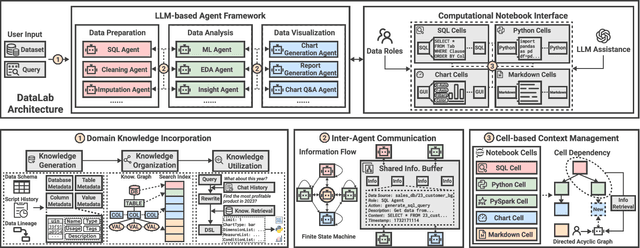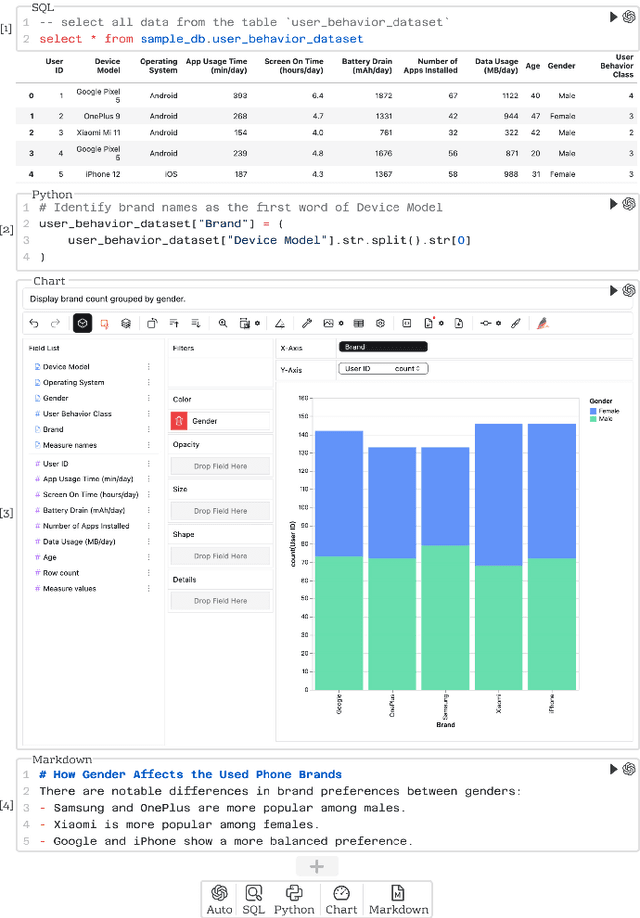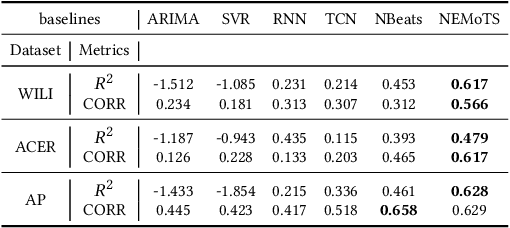Xiuqi Huang
IGenBench: Benchmarking the Reliability of Text-to-Infographic Generation
Jan 08, 2026Abstract:Infographics are composite visual artifacts that combine data visualizations with textual and illustrative elements to communicate information. While recent text-to-image (T2I) models can generate aesthetically appealing images, their reliability in generating infographics remains unclear. Generated infographics may appear correct at first glance but contain easily overlooked issues, such as distorted data encoding or incorrect textual content. We present IGENBENCH, the first benchmark for evaluating the reliability of text-to-infographic generation, comprising 600 curated test cases spanning 30 infographic types. We design an automated evaluation framework that decomposes reliability verification into atomic yes/no questions based on a taxonomy of 10 question types. We employ multimodal large language models (MLLMs) to verify each question, yielding question-level accuracy (Q-ACC) and infographic-level accuracy (I-ACC). We comprehensively evaluate 10 state-of-the-art T2I models on IGENBENCH. Our systematic analysis reveals key insights for future model development: (i) a three-tier performance hierarchy with the top model achieving Q-ACC of 0.90 but I-ACC of only 0.49; (ii) data-related dimensions emerging as universal bottlenecks (e.g., Data Completeness: 0.21); and (iii) the challenge of achieving end-to-end correctness across all models. We release IGENBENCH at https://igen-bench.vercel.app/.
GenesisGeo: Technical Report
Sep 26, 2025Abstract:We present GenesisGeo, an automated theorem prover in Euclidean geometry. We have open-sourced a large-scale geometry dataset of 21.8 million geometric problems, over 3 million of which contain auxiliary constructions. Specially, we significantly accelerate the symbolic deduction engine DDARN by 120x through theorem matching, combined with a C++ implementation of its core components. Furthermore, we build our neuro-symbolic prover, GenesisGeo, upon Qwen3-0.6B-Base, which solves 24 of 30 problems (IMO silver medal level) in the IMO-AG-30 benchmark using a single model, and achieves 26 problems (IMO gold medal level) with a dual-model ensemble.
SCORPIO: Serving the Right Requests at the Right Time for Heterogeneous SLOs in LLM Inference
May 29, 2025



Abstract:Existing Large Language Model (LLM) serving systems prioritize maximum throughput. They often neglect Service Level Objectives (SLOs) such as Time to First Token (TTFT) and Time Per Output Token (TPOT), which leads to suboptimal SLO attainment. This paper introduces SCORPIO, an SLO-oriented LLM serving system designed to maximize system goodput and SLO attainment for workloads with heterogeneous SLOs. Our core insight is to exploit SLO heterogeneity for adaptive scheduling across admission control, queue management, and batch selection. SCORPIO features a TTFT Guard, which employs least-deadline-first reordering and rejects unattainable requests, and a TPOT Guard, which utilizes a VBS-based admission control and a novel credit-based batching mechanism. Both guards are supported by a predictive module. Evaluations demonstrate that SCORPIO improves system goodput by up to 14.4X and SLO adherence by up to 46.5% compared to state-of-the-art baselines.
DataLab: A Unified Platform for LLM-Powered Business Intelligence
Dec 04, 2024



Abstract:Business intelligence (BI) transforms large volumes of data within modern organizations into actionable insights for informed decision-making. Recently, large language model (LLM)-based agents have streamlined the BI workflow by automatically performing task planning, reasoning, and actions in executable environments based on natural language (NL) queries. However, existing approaches primarily focus on individual BI tasks such as NL2SQL and NL2VIS. The fragmentation of tasks across different data roles and tools lead to inefficiencies and potential errors due to the iterative and collaborative nature of BI. In this paper, we introduce DataLab, a unified BI platform that integrates a one-stop LLM-based agent framework with an augmented computational notebook interface. DataLab supports a wide range of BI tasks for different data roles by seamlessly combining LLM assistance with user customization within a single environment. To achieve this unification, we design a domain knowledge incorporation module tailored for enterprise-specific BI tasks, an inter-agent communication mechanism to facilitate information sharing across the BI workflow, and a cell-based context management strategy to enhance context utilization efficiency in BI notebooks. Extensive experiments demonstrate that DataLab achieves state-of-the-art performance on various BI tasks across popular research benchmarks. Moreover, DataLab maintains high effectiveness and efficiency on real-world datasets from Tencent, achieving up to a 58.58% increase in accuracy and a 61.65% reduction in token cost on enterprise-specific BI tasks.
DataLab: A Unifed Platform for LLM-Powered Business Intelligence
Dec 03, 2024



Abstract:Business intelligence (BI) transforms large volumes of data within modern organizations into actionable insights for informed decision-making. Recently, large language model (LLM)-based agents have streamlined the BI workflow by automatically performing task planning, reasoning, and actions in executable environments based on natural language (NL) queries. However, existing approaches primarily focus on individual BI tasks such as NL2SQL and NL2VIS. The fragmentation of tasks across different data roles and tools lead to inefficiencies and potential errors due to the iterative and collaborative nature of BI. In this paper, we introduce DataLab, a unified BI platform that integrates a one-stop LLM-based agent framework with an augmented computational notebook interface. DataLab supports a wide range of BI tasks for different data roles by seamlessly combining LLM assistance with user customization within a single environment. To achieve this unification, we design a domain knowledge incorporation module tailored for enterprise-specific BI tasks, an inter-agent communication mechanism to facilitate information sharing across the BI workflow, and a cell-based context management strategy to enhance context utilization efficiency in BI notebooks. Extensive experiments demonstrate that DataLab achieves state-of-the-art performance on various BI tasks across popular research benchmarks. Moreover, DataLab maintains high effectiveness and efficiency on real-world datasets from Tencent, achieving up to a 58.58% increase in accuracy and a 61.65% reduction in token cost on enterprise-specific BI tasks.
An Efficient and Generalizable Symbolic Regression Method for Time Series Analysis
Sep 06, 2024



Abstract:Time series analysis and prediction methods currently excel in quantitative analysis, offering accurate future predictions and diverse statistical indicators, but generally falling short in elucidating the underlying evolution patterns of time series. To gain a more comprehensive understanding and provide insightful explanations, we utilize symbolic regression techniques to derive explicit expressions for the non-linear dynamics in the evolution of time series variables. However, these techniques face challenges in computational efficiency and generalizability across diverse real-world time series data. To overcome these challenges, we propose \textbf{N}eural-\textbf{E}nhanced \textbf{Mo}nte-Carlo \textbf{T}ree \textbf{S}earch (NEMoTS) for time series. NEMoTS leverages the exploration-exploitation balance of Monte-Carlo Tree Search (MCTS), significantly reducing the search space in symbolic regression and improving expression quality. Furthermore, by integrating neural networks with MCTS, NEMoTS not only capitalizes on their superior fitting capabilities to concentrate on more pertinent operations post-search space reduction, but also replaces the complex and time-consuming simulation process, thereby substantially improving computational efficiency and generalizability in time series analysis. NEMoTS offers an efficient and comprehensive approach to time series analysis. Experiments with three real-world datasets demonstrate NEMoTS's significant superiority in performance, efficiency, reliability, and interpretability, making it well-suited for large-scale real-world time series data.
 Add to Chrome
Add to Chrome Add to Firefox
Add to Firefox Add to Edge
Add to Edge